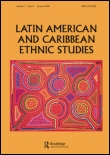
Latin American and Caribbean Ethnic Studies
Scope & Guideline
Navigating the Vibrant Cultures of Latin America and the Caribbean
Introduction
Aims and Scopes
- Ethnic and Racial Identity:
Research on the construction, transformation, and implications of ethnic and racial identities among diverse groups in Latin America and the Caribbean. - Indigenous Studies:
Focus on Indigenous rights, sovereignty, and cultural practices, highlighting the challenges faced by Indigenous communities in contemporary society. - Intersectionality and Social Inequality:
Examination of how race, class, gender, and sexuality intersect to produce unique experiences of oppression and resistance. - Postcolonial and Decolonial Perspectives:
Critical analysis of colonial legacies and their ongoing impact on contemporary social and political issues in Latin America and the Caribbean. - Cultural Practices and Representation:
Exploration of cultural expressions, including art, literature, and performance, as forms of resistance against dominant narratives and as means of affirming identity.
Trending and Emerging
- Racial Justice and Anti-Colonial Movements:
A surge in research addressing racial justice, anti-colonial movements, and the legacies of colonialism, reflecting global movements advocating for equity and rights. - Transnational and Cross-Border Identities:
Emerging studies on transnational identities and the implications of migration, highlighting the fluidity of ethnic identities across borders. - Decolonial Approaches:
Increased focus on decolonial theories and practices, emphasizing the need to dismantle colonial structures and rethink knowledge production in the context of ethnicity and race. - Environmental Justice and Indigenous Rights:
A growing trend towards exploring the intersections of environmental justice with Indigenous rights, particularly in discussions around land rights and resource management. - Intersectionality in Activism:
Research that emphasizes the importance of intersectionality in social movements, particularly how various forms of identity and oppression intersect to inform activism.
Declining or Waning
- Traditional Ethnography:
There is a noticeable decrease in traditional ethnographic studies that do not engage with contemporary issues of race and identity, as the focus shifts toward more critical and intersectional approaches. - Historical Narratives without Contemporary Relevance:
Papers that solely focus on historical narratives without linking to current socio-political contexts are becoming less common, suggesting a preference for research that connects past injustices to present struggles. - Essentialist Views of Identity:
The journal's content has shifted away from essentialist or static views of ethnic identity, favoring more nuanced understandings that reflect the fluidity and complexity of identity in the modern world.
Similar Journals
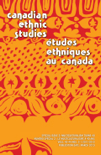
Canadian Ethnic Studies-Etudes Ethniques au Canada
Advancing Interdisciplinary Insights into Ethnic StudiesCanadian Ethnic Studies - Études Ethniques au Canada serves as a pivotal platform for interdisciplinary scholarship focused on the complexities of ethnic identity and multiculturalism within Canada. Published by the Canadian Ethnic Studies Association, this journal not only examines the rich tapestry of Canada’s diverse population but also engages with significant themes in Anthropology, History, Sociology, and Political Science. With impressive rankings—Q1 in History and Q2 in Anthropology for 2023—this journal is recognized for its rigorous approach to research, fostering critical dialogue among scholars and practitioners alike. Although currently not Open Access, articles are made accessible to those in institutions and academic settings, expanding reach and impact. By publishing cutting-edge research from 1986 to the present, this journal continues to enhance our understanding of ethnic studies, making it an essential resource for anyone involved in the study of Canada’s multicultural landscape.

MEXICAN STUDIES-ESTUDIOS MEXICANOS
Advancing Scholarship on Mexico's Rich HeritageMEXICAN STUDIES-ESTUDIOS MEXICANOS, published by University of California Press, is a distinguished journal that explores critical issues in the fields of cultural studies and history, with a keen focus on Mexican and Latin American contexts. Established in 1985, this journal serves as an invaluable platform for researchers, professionals, and students alike, aiming to deepen understanding of Mexico's complex social, cultural, and historical landscapes. With an impressive placement in the Q2 category in both Cultural Studies and History, it ranks within the top tiers of scholarly discourse, demonstrating a strong impact factor that reflects its significance in the academic community. Although it does not currently offer Open Access, the journal remains committed to delivering high-quality, peer-reviewed research that stimulates ongoing debates and enriches scholarship in the humanities and social sciences. Nestled at the heart of scholarly conversations, MEXICAN STUDIES-ESTUDIOS MEXICANOS continues to play a pivotal role in advancing academic inquiry into Mexico's past and present.

Debates en Sociologia
Stimulating Innovative Research for a Complex WorldDebates en Sociologia is a prominent peer-reviewed journal that serves as a vital platform for sociological discourse and research in the Latin American context. Published by the Pontificia Universidad Católica del Perú, this esteemed journal has embraced an Open Access model since 2005, ensuring that scholars and policymakers have unrestricted access to its rich array of articles advancing contemporary sociological thought and practice. The journal encourages submissions that stimulate critical discussions about social issues, offering a space for innovative research, theoretical explorations, and empirical studies. With its ISSN 0254-9220 and E-ISSN 2304-4284, Debates en Sociologia is committed to enhancing the visibility of research in sociology, thus making significant contributions to both regional and global academic dialogues. Its dedication to fostering interdisciplinary connections within the social sciences highlights the journal's importance for researchers, professionals, and students seeking to expand their understanding of sociological phenomena.

Temas de Nuestra America-Revista de Estudios Latinoamericanos
Bridging Historical Contexts with Contemporary IssuesTemas de Nuestra America-Revista de Estudios Latinoamericanos is a distinguished academic journal dedicated to the study and exploration of Latin American issues, cultures, and societies. Published by the Universidad Nacional de Costa Rica, Editorial, this journal serves as a vital platform for scholars, researchers, and students alike, promoting interdisciplinary dialogues surrounding the intricate dynamics of Latin America. With an ISSN of 0259-2339, it aims to publish high-quality research that addresses contemporary challenges and historical contexts relevant to the region. Although currently proprietary in access, its commitment to fostering knowledge dissemination remains paramount. The journal not only strives to advance scholarship within Latin American studies but also seeks to engage a global audience in understanding the diverse narratives and experiences that shape this vibrant region. By providing insights into social, political, and cultural topics, Temas de Nuestra America plays a crucial role in enhancing academic discourse and enriching the global academic landscape.
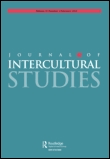
Journal of Intercultural Studies
Charting New Territories in Cultural ResearchWelcome to the Journal of Intercultural Studies, a premier publication in the fields of Cultural Studies, History, Sociology, and Political Science, brought to you by Routledge Journals, Taylor & Francis Ltd. With an impressive Q1 ranking in both Cultural Studies and History, as well as a solid performance in Sociology and Political Science, this journal stands as a vital resource for researchers, academics, and students seeking to explore the complexities of intercultural engagement and historical narratives from 1980 to 2024. Indexed in Scopus with high percentiles, the journal not only contributes to scholarly discourse but also facilitates access to a diverse range of interdisciplinary insights. While it currently does not offer open access, its comprehensive studies and authoritative articles are indispensable for those committed to understanding the nuances of cultural interactions and their societal implications.
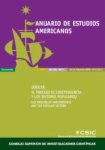
Anuario de Estudios Americanos
Exploring the Rich Tapestry of American StudiesAnuario de Estudios Americanos is a prestigious journal published by the Consejo Superior Investigaciones Cientificas (CSIC), focusing on the multifaceted dimensions of American studies. With an ISSN of 0210-5810 and an E-ISSN of 1988-4273, this Open Access journal has made its scholarly contributions freely accessible to researchers and enthusiasts alike since 1994, thus fostering international dialogue in the field. Based in Spain, the journal holds a commendable status, ranking in the Q2 category for both Cultural Studies and History as of 2023, which underscores its significance in these academic realms. Additionally, its Scopus rankings of #653/1760 in Arts and Humanities and #633/1304 in Social Sciences highlight its competitive standing among global publications. Anuario de Estudios Americanos aims to promote scholarly discourse and research on the historical, cultural, and social dimensions of the Americas, making it an essential resource for researchers, professionals, and students dedicated to exploring this dynamic area of study.
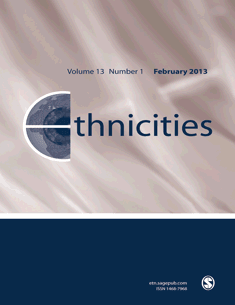
Ethnicities
Innovating Perspectives on Social InteractionsEthnicities is a leading academic journal published by SAGE Publications Ltd, dedicated to exploring the complex dynamics of ethnicity, cultural identity, and social interactions within diverse communities. Since its inception in 2001, the journal has established a reputable position in the field of Cultural Studies, evidenced by its impressive Q1 ranking in the Cultural Studies category and Q2 ranking in Arts and Humanities (miscellaneous) as of 2023. With a Scopus ranking that places it in the top 8% of journals in Cultural Studies, Ethnicities aims to facilitate critical discourse, innovative research, and scholarly exchange related to ethnicity across global contexts. Researchers, professionals, and students interested in investigating the intricate intersections of race, identity, and social policy will find valuable insights within its pages. For further engagement and access to its comprehensive articles, the journal is available without Open Access options, serving as a vital resource for understanding contemporary issues in ethnicity and cultural relations.
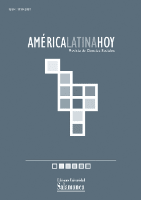
America Latina Hoy-Revista de Ciencias Sociales
Unveiling the Dynamics of Latin American SocietiesAmerica Latina Hoy-Revista de Ciencias Sociales, published by EDICIONES UNIV SALAMANCA, is a premier open-access journal dedicated to the exploration of social sciences within the Latin American context. Since its establishment in 1991, the journal has provided a platform for scholarly discourse covering a broad range of topics, including history, sociology, and political science. With an impressive Q1 ranking in History and a Q3 ranking in Sociology and Political Science, the journal exemplifies excellence and rigorous scholarship in its field. Its inclusion in prestigious databases such as Scopus, ranked #248 out of 552 in Arts and Humanities, underscores its impact as an essential resource for researchers, academics, and students alike. Based in Salamanca, Spain, the journal actively promotes interdisciplinary approaches and embraces contributions that advance the understanding of Latin American societies. With its open-access model, America Latina Hoy ensures that research findings are freely accessible, fostering knowledge dissemination and engagement across borders.

Boletin Antropologico
Fostering Intellectual Growth in AnthropologyBoletin Antropologico, published by UNIV LOS ANDES, is a vital academic journal dedicated to the field of anthropology, focusing on the diverse cultural practices, social structures, and historical contexts of societies, particularly within Latin America. With its ISSN of 0257-750X, this journal aims to provide a platform for researchers and scholars to disseminate their findings and engage in meaningful discussions that advance the understanding of anthropological issues. Although Boletin Antropologico currently does not follow an open-access model, it remains a significant resource for professionals seeking peer-reviewed content that reflects rigorous academic standards. With a commitment to fostering intellectual growth and collaboration among anthropologists, the journal serves as an essential reference for students and practitioners keen on exploring the rich tapestry of human cultures and societies.
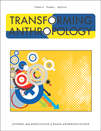
Transforming Anthropology
Innovating Perspectives on Human SocietyTransforming Anthropology is a dynamic and influential journal in the field of Anthropology, published by Wiley. With an ISSN of 1051-0559 and an E-ISSN of 1548-7466, this journal has established a reputable position within academic circles, evidenced by its impressive Q2 rating in the 2023 category quartiles and a 77th percentile rank in the Scopus Ranks for Social Sciences. Since its inception, the journal has evolved to reflect contemporary anthropological discourse, addressing crucial issues from diverse perspectives. Although it does not currently operate under an Open Access model, its content remains accessible to a global readership eager to engage with pioneering research. Spanning converged years from 1990 to 1994 and 2010 to 2024, Transforming Anthropology serves as a vital platform for exploring transformative ideas and methodologies within the discipline. Researchers, professionals, and students alike can benefit from the scholarly contributions and insightful discussions fostered within its pages, making it an essential resource for anyone invested in the complexities of human culture and society.